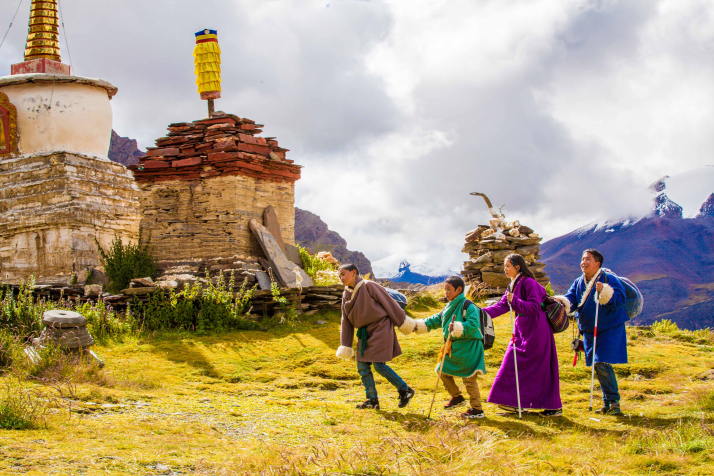| Lifestyle |
| A Song of Hope | |
| The humbling story of four visually impaired Tibetan children hits the big screen | |
|
|
 A still from the 2018 film Ballad From Tibet (COURTESY OF SHENZHEN HUAHAO FILM & MEDIA)
Thupten is a 10-year-old boy living in Lhasa, southwest China's Tibet Autonomous Region, partially sighted in one eye and blind in the other. His doctor says that there is a chance he could completely lose his sight, but that there is an operation that could offer a 50 percent chance of saving his vision. His teacher is adamant that he should have the operation right away, but Thupten is afraid and wants to see the world before his life is plunged into total darkness. Along with three friends who also suffer from blindness, Thupten embarks on an exciting adventure. Together they decide to go to Shenzhen in south China's Guangdong Province, a city more than 3,700 km away from Lhasa. They choose Shenzhen because Kelsang, the youngest of the four children, measures the distance with his arm on the map and realizes that it is merely a forearm away. During the trip Thupten is to serve as the group's leader because, despite his ailing sight, he is the only one among them who can see anything at all. But why exactly would four visually impaired children from Lhasa travel all the way to Shenzhen? Thupten and his friends are characters in the new film Ballad From Tibet, set to debut on January 9, 2018. "It's about a group of people achieving their dreams against all odds," said Zhang Wei, director of the film.  Director Zhang Wei (third left) on the set of Ballad From Tibet (COURTESY OF SHENZHEN HUAHAO FILM & MEDIA)
An odyssey The reason for the children's decision to go to Shenzhen, for them a distant, modern and entirely strange city, is their love of music. They are all talented and want to sing their hearts out in front of a national audience by participating in a Shenzhen-based reality show. Besides this shared musical goal, each of them also has their own reason for making the trip. Thupten is trying to escape the harsh reality of his life at home and feels he must see the world for what could potentially be the last time. Droma, a 12-year-old girl, longs to prove to her grandmother that she can do more than just weave clothes. Sonam is a masseur who at 16 is fed up with what he considers a boring job, while 8-year-old Kelsang is following the others simply because it sounds like fun. The foursome's trip is indeed fun, but turns out to be dangerous as well. Luckily help is on hand along the way in the form of a nomad family, a shepherd, a motorcycle club, and a TV producer's assistant. As a show of gratitude, the group repays each of them with the pears which they brought with them for food. Yet for all its filmic charm and Hollywood feel-good factor, Ballad From Tibet is in fact inspired by a true story. In 2010, a group of nine Tibetan children sang on the stage of the reality show China's Got Talent, which was broadcast nationwide. Aged 10 to 13, all of them were students from the school for blind children in Lhasa, earning a rousing applause from the four judges and studio audience alike with their pure and youthful voices. After listening to their a cappella rendition of Parental Love, a song in the Tibetan language, Gao Xiaosong, a well-known music producer and one of the judges, commented that the beauty of their singing revealed the pursuits of their hearts. Watching at home, Director Zhang felt through his television the same powerful emotion that the judges had in the studio, and was moved do something for the children. "Their desire to sing and their persistence were what touched me the most, and what I want to show in my film," Zhang told Beijing Review. Untold stories The true story of the nine kids in 2010 is not the sole inspiration Zhang cites for making the film. Back when he was a young boy he would watch blind fortunetellers with a child's inquisitiveness, and still remembers the intense curiosity he felt at the time about the life of the blind. "I vividly remember one fortuneteller leading the team by walking in front, while the others followed by placing one hand on the shoulder of the person ahead of him and holding a white cane with the other," he said. "Seeing the kids on TV reminded me of that." The process of creating Ballad From Tibet has been quite the journey for Zhang himself. Since 2013, he has been researching and making preparations for the film in Tibet, primarily by conducting interviews with local people. During these encounters he discovered that the incidence of cataracts in Tibet is among the highest in the country, due in part to excessive exposure to ultraviolet light at the high altitudes of the Tibetan plateau. The beliefs of some regions hold that the blind are being punished by heaven for transgressions in a previous life, and so in some parts of Tibet the blind are discriminated against or, in extreme cases, even abandoned. "I do not see the blind in this way. Instead, I see unique people with extraordinary capabilities and wonderful stories," Zhang said. In recent years there have been several films focusing on the blind in China. The 2014 release Blind Massage tells of the joys and sorrows of blind masseuses, while My Spectacular Theatre, released in 2010, depicts the story of a movie theater for the blind. Both movies garnered widespread recognition and were well received both at home and abroad. Ballad From Tibet looks to be following this pattern of success, having won the award for Best Children's Feature at the 13th China International Children's Film Festival in November 2017, and having earned nominations at 17 different international children's film festivals in Germany, Canada, Japan, Greece, Australia and India. "My great hope is that the audience sees that my film is more than just a children's movie. It's about the entire blind community, their lives and dreams," Zhang said. As for the choice of Tibet as the film's setting, Zhang stressed that it is not important where the characters come from. It is what happens to them, their experiences and how they deal with them that truly matter. According to Zhang, the storyline would still work if it took place in any other region of China. Zhang is working on a film about the transgender people community, and has other ideas that for now must wait to be expressed through his video camera. "I always wanted to be a man of images, someone who records ordinary people, especially marginalized groups in society," Zhang said. Copyedited by Laurence Coulton Comments to luyan@bjreview.com |
|
||||||||||||||||||||||||||||||
|